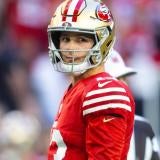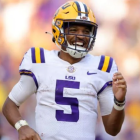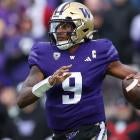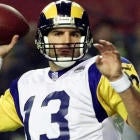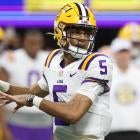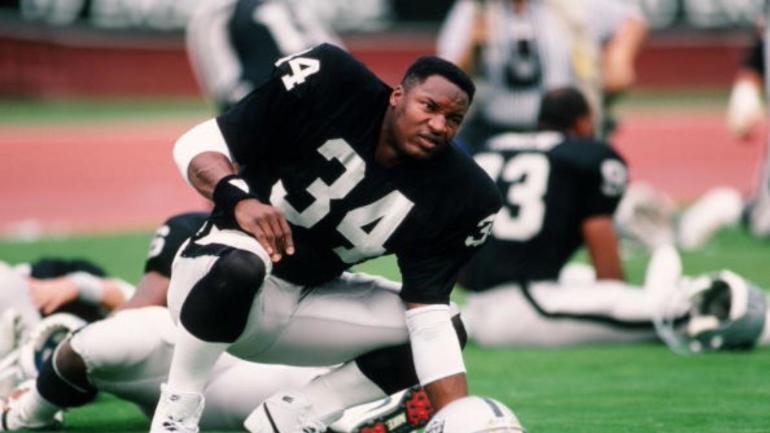
Bo Jackson's otherworldly talent has been summarized in a multitude of ways over the years. The only person to be named an All-Star in two different sports, Jackson was arguably the greatest athlete of the 20th century, with his only challenger being fellow former running back and Olympic gold medalist Jim Thorpe.
Jackson has been compared with many elite athletes both past and present. Jeff Pearlman, a New York Times Best Selling author who recently wrote a biography on Jackson titled The Last Fold Hero: The Life and Myth of Bo Jackson, found the perfect way to summarize Jackson's uniqueness as an NFL running back.
"Combined, he's the love child of Earl Campbell and Tyreek Hill," Pearlman recently told CBS Sports. "The speed of Tyreek Hill, the power of Earl Campbell, that's Bo Jackson."
Pearlman's colorful metaphor fits the bill. Jackson's size (6-foot-1, 227 pounds) rivaled that of Campbell, who checked in at 5-foot-11 and 232 pounds during his Hall of Fame career. Jackson's 40-yard dash time of 4.12 seconds is faster than Hill's recorded 40 time of 4.29 seconds.
"I put him with Jim Brown," Pearlman said when comparing Jackson to a single running back of the past. "the power-speed combination. ... He was ridiculous."
Jackson took full advantage of his one of a kind skill set. He averaged 5.4 yards per carry during his career with the Raiders. He posted the NFL's longest run for the season three separate times. Jackson had a 91-yard run in 1987, a 92-yard jaunt two years later and an 88-yard scamper during his Pro Bowl season of 1990.
No. 39: Former @Raiders RB Bo Jackson
— NFL (@NFL) October 12, 2019
"@BoJackson was a mythical figure."
📺: #NFL100 Greatest Characters on @NFLNetwork pic.twitter.com/yWBeVCqNwM
Jackson's NFL career spanned just 38 games over four seasons. He had a late start after electing not to play for the Buccaneers after being the first overall pick in the 1985 NFL Draft. Jackson, upset that a visit to the Buccaneers before the draft left him ineligible for his senior baseball season (his then-agent insisted that he had cleared the trip with the NFL, which was not the case), instead decided to sign with MLB's Kansas City Royals upon leaving Auburn.
He joined the Raiders two years after Al Davis selected him in the seventh round of the 1987 NFL Draft. Jackson joined the Raiders each season after the Royals' season ended. An All-Star outfielder in 1989, Jackson became the first two-sport All-Star after helping the Raiders capture a division crown in 1990.
A hip injury sustained during that year's divisional round playoff matchup with Cincinnati ultimately ended Jackson's NFL career. While Jackson's condensed career deprived him of a shot earning a gold jacket, Pearlman does not consider Jackson's story a tragic one.
"It's only a shame if you think of it in a very sort of traditional way," Pearlman said. "He could have been in several Hall of Fames. But if Bo Jackson had become Marcus Allen or Gary Sheffield, I wouldn't have written the book. The mythology of Bo Jackson is the most amazing part of him. The stories that are told and that folk hero thing about him is what's really cool.
"I don't view it as a tragedy of all. He's mythical. Bo Jackson is almost like a ghost in a very powerful way."

With The First Pick Newsletter
With The First Pick Newsletter
Prepare for the upcoming NFL Draft with the day’s big stories + mock drafts, big board updates and more.
Thanks for signing up!
Keep an eye on your inbox.
Sorry!
There was an error processing your subscription.
Pearlman's book offers readers an intimate glimpse into arguably the most interesting and unique athlete in modern times. They'll read never before told stories about Jackson's career and upbringing. Pearlman also gives readers a taste of the social climate Jackson found himself in as a Black athlete who grew up in the South during the 1960s and '70s and played major college sports at a major university in the South in the early '80s.
One of the stories unearthed in Pearlman's book was the tragic story of one of Jackson's teammates who died during a practice.
"In a lot of ways, Bo Jackson winning the Heisman Trophy is the least interesting thing I reported on," Pearlman said, "because it's a big subject that everyone knows about. Or the games against Florida, Alabama, 'Bo Over the Top.' Far more fascinating is there was this time when Bo Jackson was a sophomore in college and his fullback died of heat stroke.
"These people have these profound memories of Bo at the funeral, sobbing, and pulling out a Polaroid camera and taking a photo of Greg Pratt lying in his open casket. Those tell you something about what someone's been through, the path he's traveled."
The book certainly has its heavy moments, but it also brings readers into the locker room, to the minor league stadiums Jackson lit up merely by his presence and onto the MLB and NFL fields during his biggest moments. Readers will feel as if they have an all-access pass to the life one of the greatest athletes who has ever lived, and the likes of which we will probably never see again.
"The fact that he won the back-to-back state decathlons is amazing, but the fact that he won the second one without ever taking off his sweats is so ridiculously badass," Pearlman said when asked to recall his favorite Jackson athletic feat. "It's a tiny moment in the book, but the fact that he wore his sweatpants in the decathlon — in every event — and was so far ahead he didn't have to run the 1,500. And then the next day he pitches his only baseball game of the year and strikes out 13. It's just so phenomenal."










